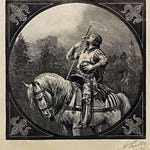Season 4 Episode 7
In the previous episode, we learned more about the historical context through which the phenomenon of Joan of Arc appears in history. We still do not know from where she comes originally, nor anything regarding her childhood. However, we do know that she came to Chinon with her troop of six or so soldiers from the loyal outpost of Vaucouleurs in the far northwestern region of now occupied France.
In this episode, for the first time, we learn something about Joan’s essence, that is, about who Joan of Arc really is. One of her most loyal fellow travellers, Jean de Metz, states it as follows:
Her words put me on fire, inspiring in me a love for her that was, I believe, divine.1
Every encounter with Joan is like confronting a divine fire. Everywhere she goes and with everyone she meets, Joan overcomes significant skepticism and opposition. She wins them over with this “fire of divine love.” In this episode she begins to win over the dauphin, Charles VII.
Reflective question
Can you describe Joan of Arc’s “essence” as she relates to your own life? If you had to describe Joan without reference to an academic historical chronology, who would you say she was and is?
Other quotes from this episode
I was myself present at the castle and the city of Chinon when the maid arrived, and I saw her when she presented herself to his royal majesty; she showed great humility and simplicity of manner, this poor little shepherdess… I heard her say the following words to the king: “Very noble Lord dauphin, I have come and I have been sent from God to bring aid to you and to the kingdom.” ~ Raoul de Gaucourt
When the king saw her, he asked Joan her name and she answered: “Gentle dauphin, I am Joan the Maid, and the King of Heaven commands that through me you be anointed and crowned in the city of Reims as a lieutenant of the King of Heaven who is King of France.” ~ Friar Jean Pasquerel
The king… went one morning alone into his oratory and there made a humble, silent request in prayer to our Lord within his heart, in which he begged him devoutly that if it were true that he was His heir, descendent of the noble House of France, and that the kingdom should in justice belong to him, might it please God to protect and defend him, or at the very worst, allow him the grace of escaping alive and free from imprisonment so that he might find solace in Spain or in Scotland, which were from times long past brothers-in-arms and allies of the kings of France. ~ Guillaume Gouffier, the dauphin’s chamberlain
The king… went one morning alone into his oratory and there made a humble, silent request in prayer to our Lord within his heart, in which he begged him devoutly that if it were true that he was His heir, descendent of the noble House of France, and that the kingdom should in justice belong to him, might it please God to protect and defend him, or at the very worst, allow him the grace of escaping alive and free from imprisonment so that he might find solace in Spain or in Scotland, which were from times long past brothers-in-arms and allies of the kings of France.
If Joan did indeed repeat to him anything like that prayer, “a sure secret that no one knew or could know except God,” as Jean Pasquerel would later declare, the impact on Charles must have been enormous. This episode resounds with significance: it has a place in Joan’s story and in history itself, a place that does not seem out of proportion to anyone who understands that it is the small event that can change life most radically.2
I am also the co-host of the Heroic Hearts podcast with Amy Chase. Heroic Hearts is devoted to a spiritual adventure with St. Joan of Arc and St. Thérèse of Lisieux! Join us on the journey!
Visit Amy’s Substack, The Occidental Tourist.
Pernoud and Clin, Joan of Arc - Her Story. p. 21.
Ibid. pp. 22-24.












